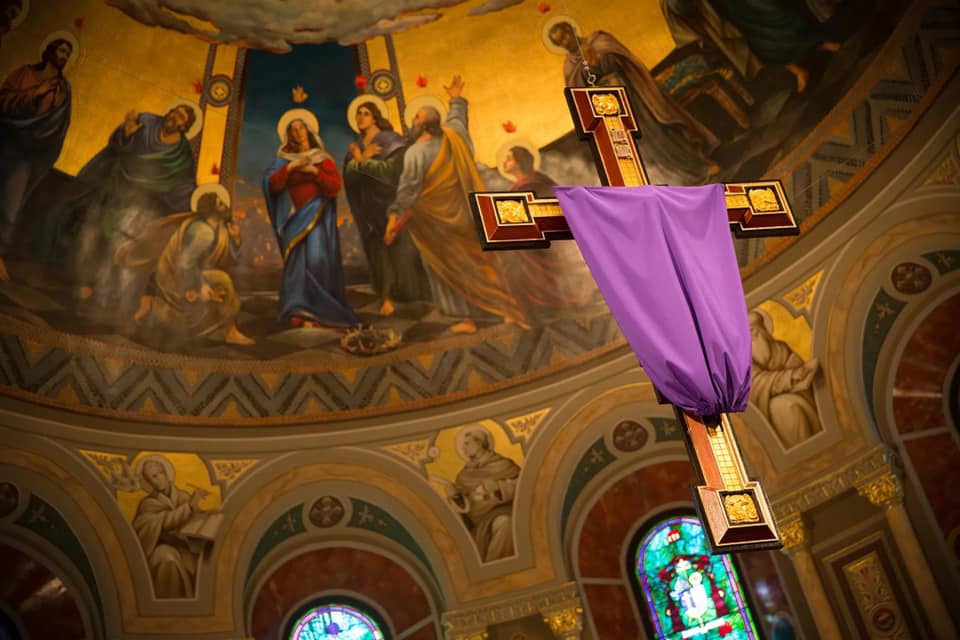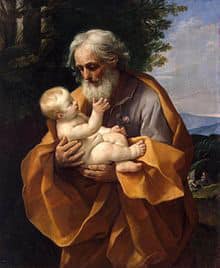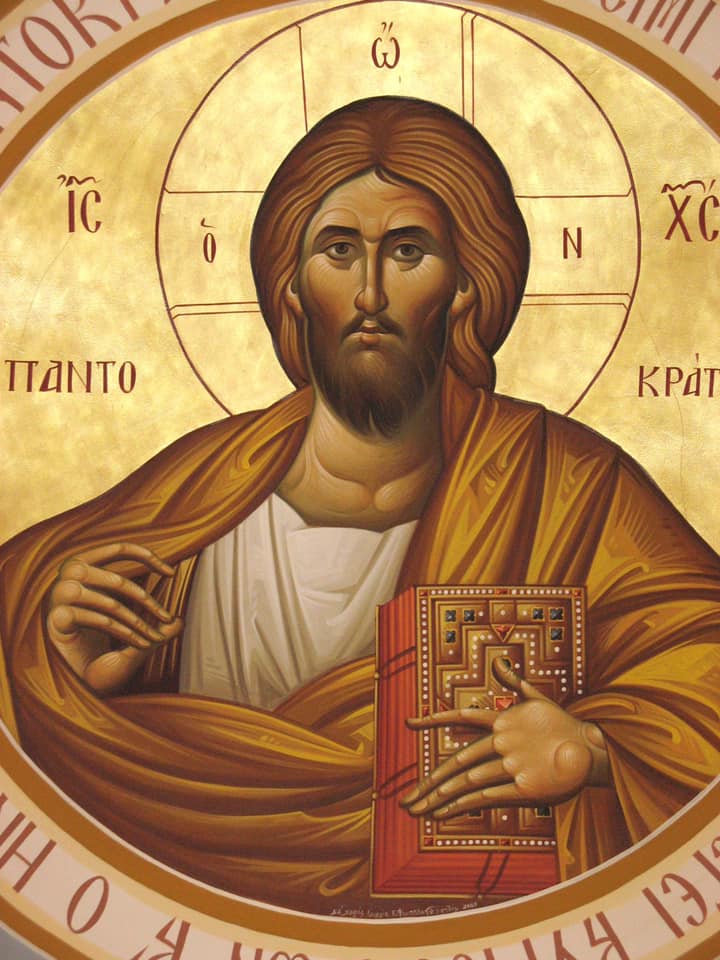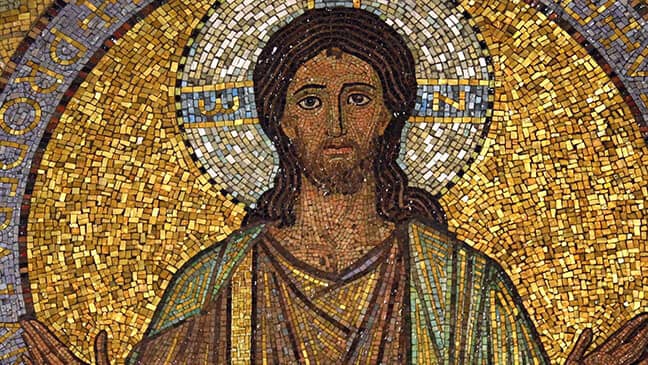Gospel Reflexion by Fr Michael Chua - 21 March 2021
 Gospel of 21 March 2021
Gospel of 21 March 2021
Fifth Sunday of Lent Year B
John 12:20-33
If a grain of wheat falls on the ground and dies, it yields a rich harvest
Among those who went up to worship at the festival were some Greeks. These approached Philip, who came from Bethsaida in Galilee, and put this request to him, ‘Sir, we should like to see Jesus.’ Philip went to tell Andrew, and Andrew and Philip together went to tell Jesus. Jesus replied to them:
‘Now the hour has come for the Son of Man to be glorified. I tell you, most solemnly, unless a wheat grain falls on the ground and dies, it remains only a single grain; but if it dies, it yields a rich harvest. Anyone who loves his life loses it; anyone who hates his life in this world will keep it for the eternal life. If a man serves me, he must follow me, wherever I am, my servant will be there too. If anyone serves me, my Father will honour him. Now my soul is troubled. What shall I say: Father, save me from this hour? But it was for this very reason that I have come to this hour. Father, glorify your name!’
A voice came from heaven, ‘I have glorified it, and I will glorify it again.’ People standing by, who heard this, said it was a clap of thunder; others said, ‘It was an angel speaking to him.’ Jesus answered, ‘It was not for my sake that this voice came, but for yours. ‘Now sentence is being passed on this world; now the prince of this world is to be overthrown. And when I am lifted up from the earth, I shall draw all men to myself.’
By these words he indicated the kind of death he would die.
Reflexion
“We should like to see Jesus.” For the past few months, many Catholics had been longing and praying for this same request: “we should like to see Jesus,” not just virtually, on the screen of their television, computers or handheld devices, but to truly see our Lord in the flesh, in the tabernacle, in the church, as His body is placed on our palms or on our tongues.
So many would have sighed with relief, still others moved to tears, as they stepped into church last week. It is one thing to gaze lovingly at an image of a loved one in a picture, and an entirely different experience to meet him or her face to face. The former is just a pale shadow of the latter. But today, many would be shocked and troubled again the moment they stepped into church to behold the image of our Beloved Lord hidden behind a purple veil. Just when we had found Him after longing to see Him, His visage is hidden from our sight once again.
Coming into our churches with our crucifixes and holy images covered, evokes within us the emptiness of a world without Christ. This is not just a hypothetical scenario in a dystopian world that has forgotten God. We have experienced it most painfully in the past few months. With our churches and chapels closed, it does seem as if Christ has abandoned us to our misery and predicament.
But it is also in the midst of such visible absence of our Lord’s presence that we come to recognise how wrong we have been. The world has always needed Jesus Christ and always will, although we have often taken that for granted. It is only when the Lord had been taken away from us, when our churches and chapels were closed, that we came to realise how much we really missed Him. In a paradoxical way, His absence helped us to appreciate His presence.
This is what our Lord did when He went to the cross. His death is an embodiment of the words He utters in today’s gospel: “unless a wheat grain falls on the ground and dies, it remains only a single grain; but if it dies, it yields a rich harvest.” By mounting the wood of the Cross that first Good Friday, He opened the gates of heaven and the doorway of salvation to all peoples. He united God and humanity, and humanity with each other. On the Cross He gave every last drop of Himself as blood and water flowed from His pierced side, the same blood and water types for the Sacraments that His Mystical Body (the Church) offers for Salvation, Baptism and the Eucharist. Because of His death, our Lord had removed the mourning veil, and tore the veil which hid the mystery of God from man’s gaze. It is ironic that the veil of our crosses reveal more than they hide. They expose the folly of our ambitions and spotlight the wisdom of God’s plan. Hidden now from our sight, the veils are a reminder that we see God clearest of all when we see Him hanging from the cross.
Just as months of fasting from sacramental communion had heightened our hunger and thirst for the Lord and for communion with Him, the fasting of our senses through this veiling of His image should deepen our longing and love for the Lord. We are confident that our hunger will be sated, our prayers will be answered, our longing will be satisfied on Good Friday when the cross will be unveiled and we will get to behold the beauty of our Lord once again. The Cross is the lens through which we are called to see Him, the world and each other; the Cross gives us our perspective and opens our eyes to reality as God sees it. From the cross we will see an end to sin and division: “And when I am lifted up from the earth, I shall draw all men to myself!”
Christ looks lovingly at us through pained eyes on the Cross, eyes now hidden from our sight, dare we look back at him? What is His response if we do? Judgement? Condemnation? …. No …. I can tell you with certainty that when He is looking back at you from behind the veil, it is a look of love, mercy and longing … longing that we love more perfectly in our lives by living life through the lens of the Cross. As we echo the words of the Greeks who came in search of Him in today’s gospel, “we should like to see Jesus,” He reveals to us that the only way that we are going to see Him, is to do what He tells us to do: “Anyone who loves his life loses it; anyone who hates his life in this world will keep it for the eternal life.” Like Him, we must become that wheat of grain that falls on the ground and dies in order to yield the rich harvest of eternal life.
Gospel Reflexion by Fr Michael Chua - 19 March 2021
 Gospel of 19 March 2021
Gospel of 19 March 2021
Solemnity of St Joseph, the Spouse of the Blessed Virgin Mary
Matthew 1:16,18-21,24
How Jesus Christ came to be born
Jacob was the father of Joseph the husband of Mary; of her was born Jesus who is called Christ.
This is how Jesus Christ came to be born. His mother Mary was betrothed to Joseph; but before they came to live together she was found to be with child through the Holy Spirit. Her husband Joseph; being a man of honour and wanting to spare her publicity, decided to divorce her informally. He had made up his mind to do this when the angel of the Lord appeared to him in a dream and said, ‘Joseph son of David, do not be afraid to take Mary home as your wife, because she has conceived what is in her by the Holy Spirit. She will give birth to a son and you must name him Jesus, because he is the one who is to save his people from their sins.’ When Joseph woke up he did what the angel of the Lord had told him to do.
Reflexion
The title given to St Joseph in today’s feast seems to focus on his spousal relationship with the Blessed Virgin Mary. This is, of course, a chaste relationship, as the Church affirms the perpetual virginity of Mary as one of her dogmas of faith - that she was a Virgin before the birth of our Lord, she was a Virgin at His birth, after He was born and she remained a Virgin till her death.
But today, I would like to consider the paternity of St Joseph, his fatherly relationship to our Lord Jesus Christ. The fact that their relationship and St Joseph’s paternity is not biological, highlights the importance of other elements essential to fatherhood that goes beyond blood ties. A true father is more than one who sires a child. According to Pope St John Paul II, St. Joseph’s paternity is not simply “an ‘apparent’ or merely ‘substitute’ fatherhood. Rather, it is one that fully shares in authentic human fatherhood and the mission of a father in the family.”
It is not accidental that Jesus needed a human father—even though He is the Son of the Eternal Father. It is not accidental that Mary needed a committed and loving husband for the plan of God to be fulfilled as He willed it. Mothers and fathers are a fundamental requirement to families and human life, not one option among many. The sacredness and dignity of this calling is incomparable to any other human relationship.
Pope Benedict XVI observed during his visit to Cameroon in 2009, that all fatherhood shares in the one paternity of God and “Saint Joseph is a striking case of this, since he is a father, without fatherhood according to the flesh. He is not the biological father of Jesus, whose Father is God alone, and yet he lives his fatherhood fully and completely. To be a father means above all to be at the service of life and growth.”
And the few instances where we read about St Joseph, we see evidence of this. St Joseph is prayerful, noble, loving, hard-working and always docile to the will of God. He adores Our Lady. He sacrifices everything for Christ. In a world where personal happiness and one’s reputation are paramount, St Joseph shows us that even these must give way to the plan of God. Where self-gratification and self-absorption are considered normative, St Joseph shows us that the hallmark of paternity is its sacrificial character. He sets aside his own plans and dreams in order to submit to God’s plan, even when that plan was wrought with uncertainty and risks.
From the example derived from St Joseph, we hope to recover once again the vision of fatherhood, a concept that has been attacked on all fronts - from attacks on God’s fatherhood to the absent father which is the cause of so many broken families. Much of the mess that we see in marriages and families is due to the absent or nominally present father. It is no wonder that if the devil wishes to attack the institution of the family, the father of the family would be his primary target.
But paternity would be meaningless if it was not tied to spousal fidelity. As the adage goes: the best gift a father can give his children is to love their mother. St Joseph is a great father to Jesus Christ because he is a great husband to Mary. Who could possibly be a better witness in this matter than Mary? In a moment of distress, when our Lord went missing in Jerusalem at the age of 12, she speaks of Joseph’s paternity as equal to her own maternity: “Behold,” she says, “your father and I have been looking for you anxiously.” (Lk 2:48)
The statement begins with the scripturally rich word, “Behold.” Just as St John the Baptist pointed at Jesus and exclaimed, “Behold the Lamb of God who takes away the sins of the world,” or when Pilate presented Christ to the mobs with these words, “Behold the Man,” or when our Lord Himself, from the cross establishes a new relationship between His mother and His beloved disciple, “Behold your son... Behold your mother,” today on this feast, the Church shows us St Joseph and declares, “Behold your father.”
Gospel Reflexion by Fr Michael Chua - 20 March 2021
 Gospel of 20 March 2021
Gospel of 20 March 2021
Saturday of the Fourth Week of Lent
John 7:40-52
The Law does not allow us to pass judgement on a man without hearing him
Several people who had been listening to Jesus said, ‘Surely he must be the prophet’, and some said, ‘He is the Christ’, but others said, ‘Would the Christ be from Galilee? Does not scripture say that the Christ must be descended from David and come from the town of Bethlehem?’ So the people could not agree about him. Some would have liked to arrest him, but no one actually laid hands on him.
The police went back to the chief priests and Pharisees who said to them, ‘Why haven’t you brought him?’ The police replied, ‘There has never been anybody who has spoken like him.’ ‘So’ the Pharisees answered ‘you have been led astray as well? Have any of the authorities believed in him? Any of the Pharisees? This rabble knows nothing about the Law – they are damned.’ One of them, Nicodemus – the same man who had come to Jesus earlier – said to them, ‘But surely the Law does not allow us to pass judgement on a man without giving him a hearing and discovering what he is about?’ To this they answered, ‘Are you a Galilean too? Go into the matter, and see for yourself: prophets do not come out of Galilee.’
Reflexion
You must be familiar with the saying, “think outside the box.” It means to think creatively, unconventionally and from a different perspective. Does this apply to our Christian faith? Many have argued so, making the case that we need to depart from the old ways of thinking and doing things in the Church, if the Church is to survive or remain relevant. But this is not what we are called to do. Christians are not called to innovation, we are called to imitation, to greater fidelity to Christ, who is our perfect model. What is not needed is attempting to reinvent the wheel, to make Christ into something more palatable to contemporary taste.
The problem with the Pharisees was that their thinking and reading of scriptures was boxed in, limited by deeply instilled prejudices and weighed down by their own sense of righteousness and rightness. It wasn’t because they lack innovation, but they lacked fidelity to the Word of God. Instead of conforming to the Word of God, they had chosen to shape and spin the Word of God to fit into their normative way of thinking and expectations.
To even consider peeking outside the box of their thinking would be too humiliating, it would demand nothing less than an admission that they could be wrong. And so, they refuse to acknowledge that their interpretation, being like any other interpretation, could just be an opinion, it does not necessarily have to be the truth.
Why couldn’t they accept that the Lord was the long awaited Messiah? Was it because our Lord did not fit the bill? The real truth was that the Pharisees in particular, and the Jews contemporary to Jesus, in general were unable to go beyond certain expectations which stemmed from their reading of scripture. They expected a political Messiah that would reestablish Israel’s independence and restore the legendary Davidic dynasty. This was the conclusion that they wanted, so every scriptural text and interpretation had to be bent to its fulfilment. So, the point is that Scripture was not mistaken in its prophecies, they were mistaken in their interpretation.
The failure of the Pharisees to recognise our Lord despite their knowledge and vast learning should be an important lesson for us. Let us not be so presumptuous to think that we have figured out the Lord perfectly and feel disappointed in Him when He doesn’t act according to our narrow timetable and agenda. Don’t be so arrogant to think that your box is so big that it can contain God. God is far bigger than your pitiable box. Not even the universe could contain Him. But a young Jewish girl who humbly submitted to His will would be allowed to be the container of the uncontainable, the mother of the One who has no beginning and no end. So before you proceed to pass judgment on God, give Him a hearing and I can assure you that if you do so with humility and docility, you will have much to discover, for nothing, absolutely nothing, can plunge the depths of His wisdom and knowledge.
Gospel Reflexion by Fr Michael Chua - 18 March 2021
 Gospel of 18 March 2021
Gospel of 18 March 2021
Thursday of the Fourth Week of Lent
John 5:31-47
You place your hopes on Moses but Moses will be your accuser
Jesus said to the Jews:
‘Were I to testify on my own behalf, my testimony would not be valid; but there is another witness who can speak on my behalf, and I know that his testimony is valid. You sent messengers to John, and he gave his testimony to the truth: not that I depend on human testimony;
no, it is for your salvation that I speak of this. John was a lamp alight and shining and for a time you were content to enjoy the light that he gave. But my testimony is greater than John’s: the works my Father has given me to carry out, these same works of mine testify that the Father has sent me. Besides, the Father who sent me bears witness to me himself. You have never heard his voice, you have never seen his shape, and his word finds no home in you because you do not believe in the one he has sent.
‘You study the scriptures, believing that in them you have eternal life; now these same scriptures testify to me, and yet you refuse to come to me for life! As for human approval, this means nothing to me. Besides, I know you too well: you have no love of God in you. I have come in the name of my Father and you refuse to accept me; if someone else comes in his own name you will accept him. How can you believe, since you look to one another for approval and are not concerned with the approval that comes from the one God?
Do not imagine that I am going to accuse you before the Father: you place your hopes on Moses, and Moses will be your accuser. If you really believed him you would believe me too, since it was I that he was writing about; but if you refuse to believe what he wrote, how can you believe what I say?’
Reflexion
One would imagine that after centuries of mistakes and failures and experiencing the consequences thereof, one would have learnt the important lesson of not repeating the mistakes of the past. But both the first reading and the gospel show us that some people often do repeat the same mistakes despite being given countless opportunities to mend their ways and move on. How the Jews rejected our Lord in the gospel would be a repeat of how their ancestors, the Israelites, rejected God in the desert.
In the first reading, we see Moses giving testimony and defending his people before God who is on the verge of punishing them because they had turned away from Him by making a molten calf, worshiping it and sacrificing to it. They forgot how God had brought them out from the land of Egypt.
As we can see in today’s Gospel, we see a repeat or perhaps a continuation of the story of rejection. The Jews refused to recognise and accept our Lord, the Son of God, who was sent by His Father. But in the gospel story, instead of Moses defending the people before God, it is now Jesus who has to defend Himself and produce witnesses to support His testimony. According to Jewish Law (Dt 19:15), no accusation will stand against a person unless it is supported by at least two witnesses.
Our Lord, however, provides not just two witnesses but four - St John the Baptist, His miracles, the Father and finally, Moses in the form of the scriptures which are attributed to Moses. If the Jews really had believed in the scriptures of Moses they would have believed Jesus too, because the words of scripture or Moses testify about Him. But our Lord then reminds His accusers that it is actually not He who is on trial but His enemies. And though Moses had defended their ancestors in the past, this time, Moses will not stand in the breach to defend them against their insolence in rejecting our Lord.
The Jews saw how God brought them out of the land of Egypt, but just like their ancestors they didn’t believe Him. Now that they have seen Jesus’s life and works, they should have believed but history repeats itself - once again they choose not to believe Him. They see and hear God’s works. They knew the Scriptures very well, but nevertheless they didn’t believe. This was indeed a great mistake on their part but it isn’t the greatest mistake of all. Their greatest mistake is not learning from their past mistakes and therefore, condemning themselves to a cycle of sin.
Despite their repeated mistakes, God did not give up on them as God does not give up on you. We all make mistakes. Some more costly than others. We all do things we shouldn’t. We all say things we shouldn’t say. But no matter where we are in our Christian journey, when we make these mistakes, remember this: mistakes do not define you — they refine you. God wants us to learn from our mistakes. And if we let Him, God will use the results of our mistakes as the foundation upon which He can build a new life.
